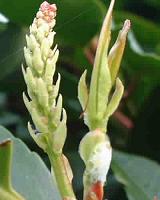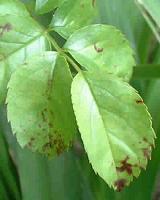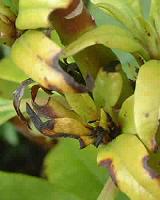Plant Health, for Happy Home and Container Gardens
All plants are at risk from pests and diseases. Prevention is always better. Practice good hygiene when working with plants. Use sterile pots and potting mixtures. Inspect your plants regularly.
Check the underside of leaves, stems, soil etc. Look for signs of the pests and diseases described below. Try and detect any problems early. Plants can’t speak to you, but will indicate their unhappiness in other ways.
Plant Pests

Many different kinds of plant pests can affect your plants’ health. Caterpillars and weevils feed by chewing and biting the plants. Aphids and scale insects suck the sap out of the plants. Snails eat plants and leave trails.
Ants eat the roots of plants near their nest. Treat the ant problem with a mixture of icing sugar and borax. Dust the area around the nest with this mixture.
There are many different kinds of bugs, and many different insecticides. Look at alternatives before treating your plants with strong insecticides like malathion or fenitrothion. Try an environmental friendly solution first. A soft soap solution or quassia is more environmentally friendly, and cheaper.
Environmentally friendly pest control measures ensure good plant health. It also prevents the destruction of garden friendly bugs and worms.
Gardens Alive
specialises in organic and environmentally friendly garden supplies.
Snails love young shoots. Get rid of snails with a snail trap. Open a tin of beer with a tin opener (to allow lots of space for the snails to fall in). Dig a hole in the ground and place the open tin, half full of beer, in the hole. The top of the tin should be level with the ground. Fill in all the sides and cover with cabbage leaves. The snails are attracted by the smell of hobs, and will drown in the beer.
Plant Deficiencies

Plants may develop mineral deficiencies when not fed properly. This has a negative effect on plant health. Mineral deficiencies can be identified by looking at symptoms. Many of these symptoms may occur through the use of chemical fertilizers. Chemical fertilizers eventually cause an imbalance in the soil.
Organic feedings at regular times will result in almost disease free container plants. Healthy plants are not easily infected. Increase your plants’ resistance to disease by feeding the well on a balanced diet.
Take time and means to feed your plants now. Investment in plant health now, will save you effort and disappointment later on. Mineral deficiencies include:
Boron
A boron deficiency causes rotting on the inside. Rectify this by feeding with good organic compost.
Potassium
Potassium shortages cause brown spots and scorch marks on leaves and fruit. Rectify this by feeding with more compost than usual.
Magnesium
This mineral deficiency causes the lower leaves of the plant to turn yellow. The veins remain green. Rectify this by feeding with good organic compost.
Calcium

Calcium deficiencies show up as brown patches at the bases of fruit. Growing points of shoots die back. Leaves turn purple brown. Rectify calcium deficiency by applying lime. Stop using sulphate of ammonia fertilizer (or any other sulphate fertilizer). Apply large quantities of other ammonia and well rotted manure.
Phosphor
A shortage of phosphor produces stunted leaves and purple tints in older foliage. The remedy for this mineral deficiency is a good dressing of bone meal in the autumn.
Chlorosis
Chlorosis is the yellowing of plant foliage due to the lack of chlorophyll in the plant. These symptoms are similar to a magnesium deficiency. The remedy is the same; feed with good compost!
Iron and Manganese
With this deficiency the foliage of the plants turn yellow early in the season. An iron deficiency causes the youngest leaves to loose their color first. Rectify this mineral deficiency by feeding with good organic compost.
Birds and Pets
Birds can cause damage to plants. The stop the plant growth by shredding leaves for their nests. They also pick of flower buds and damage fruit. Normally bird damage is not excessive, and the birds make up for it through their presence in the garden.
Dog and cat urine is very acidic. It damages plants and paintwork on clay pots. It also changes the balance in the soil. This can have a long term effect on plant health. Train your animals and clean up behind them, to minimise damage to the plants.
I believe that animals should be kept in a separate animal friendly garden. Keep them away from the entertainment area.
Climatic Conditions
Plant health is affected by hail, snow, heavy rain, frost, heat, winds and drought. Consider these conditions carefully when placing a container in the
garden design
. Make provision for protection of plants from the elements as far as possible.
Attention: This is limited to the next 7 lucky individuals
“The FREE Shed Plan and Garden Improvement Project ”



